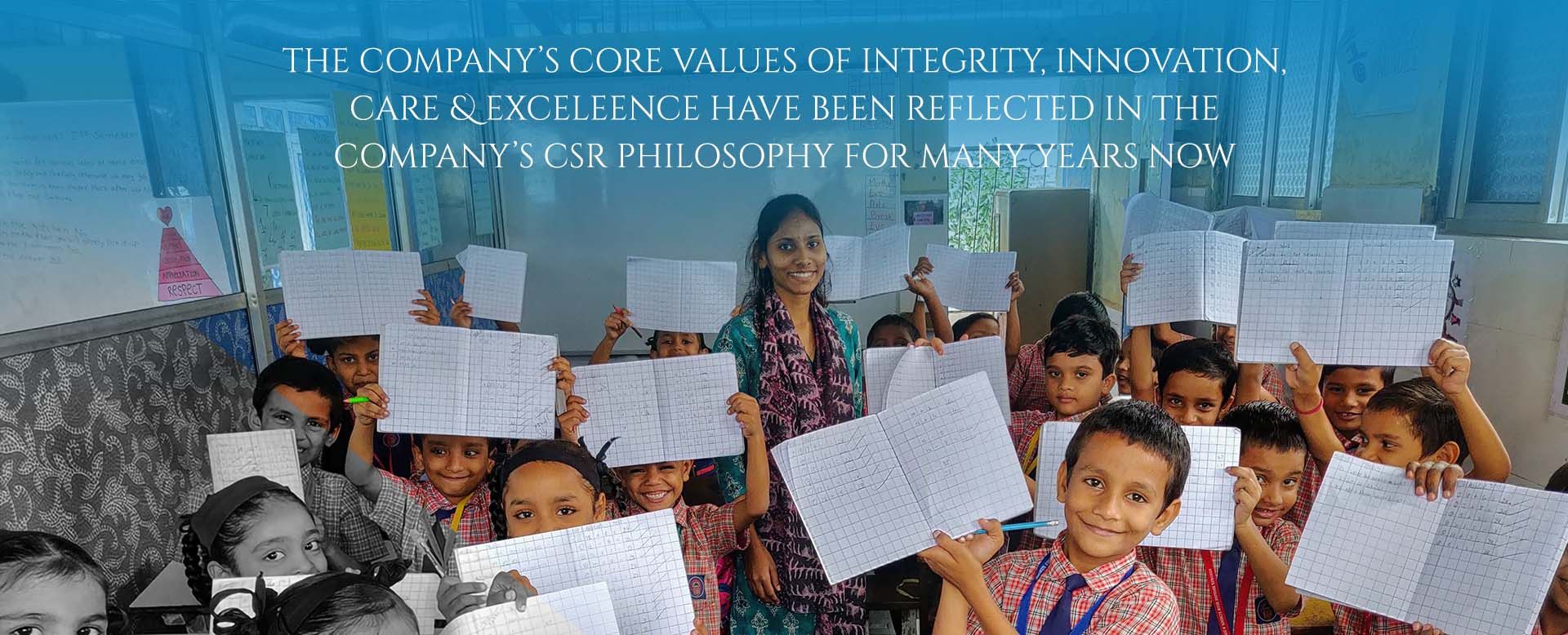CSR Plan of Jewelex India Pvt. Ltd. for F.Y. 2021-22
Corporate Social Responsibility (CSR) can be defined as the commitment by business to behave ethically while contributing to economic development, and also striving to improve the quality of life of the community in which it operates and society at large.
Jewelex India Pvt. Ltd.’s CSR philosophy:
The company’s Founders and Directors firmly believe in promoting a just & fair corporate and social environment. Being a socially responsible corporate and also contributing to the underprivileged sections of society, are the cornerstones of the company’s CSR philosophy.
CSR activities to be supported:
The company can undertake or support CSR activities, mainly for the following causes:
- Covid – 19 relief
- Promoting Education
- Promoting Healthcare, including preventive healthcare
i.) Covid – 19 relief :
The Year 2020 was the beginning of the Corona Virus / Covid – 19 pandemic. Special focus was therefore made to contribute towards the Covid affected. Organisations that provide relief by way of ameliorating hunger & illness caused by the virus were be supported.
The Corona virus fear & subsequent Lockdown imposed, led to large scale of migration of labour from the cities to their homes in the hinterland. This caused enormous hardship to large sections of poor people who were either left stranded on the highways or embarked on long & arduous journeys without any means to do so. Hence, there was need for immediate relief to them in the form of Food packet / ration kits distribution, so that they could sustain themselves and their families till they reached their destinations or remained locked up in their homes in the slums. Many organisations led the relief operations by providing either cooked meals or food packets to those in need. The pandemic also caused immense misery to those who got infected by the Sars – CoV2 Virus. They had to either avail treatment under home quarantine or had to be hospitalized with severe symptoms like fever, lung infection & low oxygen levels, which could result in death. In view of the rapidity with which the pandemic was spreading, the medical infrastructure was stretched to the maximum to cope with the patient load. Hence, hospitals which were providing medical relief needed urgent assistance to help those in need. Equipment was in short supply and some good equipment needed to be urgently arranged to save many lives. Accordingly, the company supplied the High Flow Nasal Cannula (HFNC Machines) and their consumable spares to Government / Municipal Hospitals in Mumbai.
During the current year also, if there is any requirement for support to be given to relevant organisations providing Covid relief, then the company can provide requisite assistance to them.
ii.) Promoting Education & Vocational skills :
The importance of education cannot be underestimated in improving the overall economic and social scenario in any society. Especially in a developing country like India, the importance of providing affordable education and vocational skills cannot be overstated.
The Government does it’s bit for providing education to all, but in the Indian context with large outlay required for Education budget, the private sector can play a major role in improving the education milieu by contributing to improvements in education outcomes.
In recent decades, India has made significant progress on access to schooling and enrollment rates in primary education but high dropout rates and low levels of learning/retention, remain challenges for the state and central government.
A high percentage of children drop out before completing five years of primary school, and an even higher percent before finishing upper primary school. Lack of teachers also remains a major stumbling block in improving learning outcomes.
Quality of learning is thus a major issue and reports show that children are not achieving class-appropriate learning levels. According to Pratham NGO’s ‘Annual Status of Education Report’ (ASER) 2018, only about 50 percent of children in Standard V in rural India can read a Standard II text. Arithmetic is also a cause for concern, as only 28 percent in Standard V can do a division calculation.
Unfortunately, with the pandemic induced School shut downs, the learning outcomes are expected to further deteriorate. It is expected that many children will not return to Schools, as they may be forced to seek employment to support family incomes. The plight of the girl child is expected to be even worse and many may be forced into bonded labour or even child trafficking.
Hence, the company will support Institutions or Schools which strive for improvement in the education standard for the children and / or Institutions which provide employment enhancing vocational skills to the youth.
To name a few - ‘Muni Seva Ashram’ is constructing the Eklavya Model Residential School complex, mainly for the benefit of tribal children near Goraj, Waghodia taluka of Gujarat. A donation towards their Library Building on the campus would benefit the children.
‘Jeevantirth’ is an NGO which strives to provide value added education support to the Schools in the rural areas of Gujarat, like Banaskantha District. They provide children in the primary level with educational kits & methodology which is different from just the conventional Black Board pedagogy. Their aim is to make learning fun, so that the children’s motivation to attend School is enhanced, thereby reducing absenteeism or drop-out rates. It also enhances their learning capabilities.
iii.) Promoting Healthcare, including preventive healthcare :
Health care, especially preventive healthcare, is one of the basic essentials to reduce suffering in human life and thereby improve the quality of living. A caring society focuses on the provision or access to adequate and timely medical care.
In a vast developing country like India, with a population of over 1.3 billion people, majority of who live in the rural hinterland, access to even basic medical care is a luxury not easily within reach. Only 2% of doctors are in rural areas - where over 65% of the population lives. Even in urban areas, quality medical care is becoming unaffordable and out of reach to a vast majority of the population.
The private healthcare sector is responsible for the majority of healthcare in India. Most healthcare expenses are paid out-of-pocket by patients and their families, rather than through insurance. This has led many households to incur ‘Catastrophic Health Expenditure’, which can be defined as health expenditure that threatens a household's capacity to maintain a basic standard of living. One study found that over 35% of poor Indian households incur such expenditure and this reflects the detrimental state in which Indian health care system is at the moment. With government expenditure on health as a percentage of GDP quite low and the rise of private health care sector, the poor are left with fewer options than before to access reasonable health care services.
Amidst this backdrop, there are NGOs or Charitable Trusts which strive hard to reach out to such populace in the rural and urban areas. Also, there are large Public Hospitals in cities like Mumbai which provide the full range of specialized care upto tertiary level and that too at affordable or subsidised basis for the poor or low income population. The company can support such institutions with Medical equipment or upgrading their infrastructure, so that patient care can be improved.
One such institute, ‘Divyajyoti Trust’ to whom the company has donated in the past for their Eye Hospital, is currently expanding their infrastructure facilities at a new campus near Amalsadi in Mandvi taluka of Gujarat. The company to contribute towards the expansion project undertaken at the proposed complex with state-of-the art Surgical, OPD and Training facilities in this rural area. This project will enable sight restoration & treatment to the rural poor in this region, over a long period of time.



